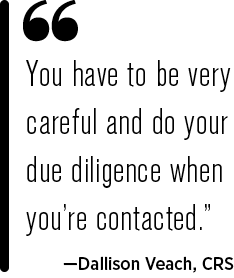Agents must stay vigilant as fraud and scams become more prevalent in the residential real estate profession
By Jason Henninger
Anywhere there are financial transactions, the threat of fraud comes with them.
Real estate is no exception; high-dollar sales mean creative con artists bring their A-game. To prevent falling victim to fraud, real estate agents must clearly understand what types of scams are out there. But perhaps even more important is to gain recognition of the red flags that come up when facing the most common types of fraud and to be vigilant in verifying the facts.
Be aware
It’s hard, especially when you are hungry to make a sale, to remember that things that sound too good to be true are usually just that. But in challenging markets with low inventory and high interest rates, it pays to stay wary.
Do some digging: “You have to be very careful and do your due diligence when you’re contacted,” says Dallison Veach, CRS, owner of Veach Realty Group in Springfield, Virginia. Her 20 years of experience have placed her in the path of con artists more than once. Sometimes, a quick fact check is all you need to send the fraudster scurrying; other times, the con is more complex. “They’re contacting you through WhatsApp, or they message or text you,” she says. “And you’re never able to get them on the phone or talk to them in person. They may or may not send you copies of their driver’s licenses, which usually turn out to be fraudulent. But if you do a little bit of digging, ask more questions or to meet in person or use FaceTime, they clam up and go away.”
 Online-only transactions: While a brief verification of facts is enough to get rid of these fraudsters, many more complicated and sophisticated scams may take greater effort to uncover. Further, certain transactions may be more likely to entice crooks.
Online-only transactions: While a brief verification of facts is enough to get rid of these fraudsters, many more complicated and sophisticated scams may take greater effort to uncover. Further, certain transactions may be more likely to entice crooks.
Lisa Paffrath, CRS, broker/owner of Better Homes and Gardens Real Estate Grand View North in Flagstaff, Arizona, works near the Grand Canyon with a lot of vacant land. In her market, doing business with people you don’t meet face-to-face is common. Some transactions are online only, and others may deal with inherited property the owner has never visited. The lack of in-person interaction has attracted a growing number of dishonest people. “In the last two years, we have been bombarded with fraudulent sellers and buyers,” Paffrath says. “When this first occurred here, we weren’t prepared and spent a lot of time with one seller before realizing it was someone out of the country trying to list property that they did not own.”
Fake checks: While some may need an extra level of awareness for any transaction that isn’t in person, that doesn’t mean the con artists can’t work their con right in front of you. One growing form of fraud, according to Veach, involves people posing as potential buyers with the intent to steal confidential banking information during money transfers. She also personally experienced an attempt to pull a bait-and-switch with deposits.
In that scam, the fake buyer turns in a realistic-looking, counterfeit cashier’s check for a larger-than-usual earnest money deposit only to turn around a few days later and cancel the purchase—due to a local regulation allowing for three days to void a contract—in hopes that the fake check would be deposited and the refund would be issued before the check was discovered to be phony.
Be vigilant
In an ideal world, relying on a photo ID as proof of identity would be enough to keep the bad actors away. But it definitely isn’t enough. Very realistic identification is getting easier to counterfeit every day. In encountering the aforementioned scam, Veach had asked for and received bank statements, identification and proof of funds. Everything looked completely legitimate. Fortunately, the title company verified the check before depositing it, uncovering the fraud.
Margaret Rome, CRS, broker/owner of HomeRome Realty in Baltimore, Maryland, is a solo broker with 33 years of experience in real estate and a lot of knowledge on how to spot fraud. She has a weekly radio show, “All About Real Estate,” and one recent episode focused on scams. This show brought up a lot of responses from listeners, sharing their stories of encountering fraud of all levels of sophistication. Lots of scammers seem legitimate because they often emulate perfectly appropriate practices. “There’s only one difference between a salesperson and a con person,” she says. “Both need the savvy to sell, to be knowledgeable, to be presentable and to be personable. Both need to be believable. The only difference is one word: intent.”
These experienced agents have all encountered both obvious scammers and very sly ones. A series of articles could be dedicated to their stories—from numerous attempts at wire fraud to a lawyer ripping off an elderly parent struggling with dementia—but perhaps the greatest value is to learn the many warning signs.
By staying informed, patient and vigilant, agents can protect themselves and their clients from falling victim to fraud. Prioritize safety and security above convenience or speed. So much of this business revolves around an agent’s relationships and reputation. Building on those will always be a better way to create a successful business than a quick sale here and there.

Real Estate Fraud Dos and Don’ts
DO:
- Trust your instincts and your experience. If it feels off, you are right to check the facts.
- Ask questions. Ask all the questions you need. A legitimate buyer or seller will provide consistent and verifiable answers.
- Check with state and local agencies to verify identities and ownership and keep up to date with your state’s wire fraud advisory.
- Insist on some face-to-face communication, even if it’s through video conferencing.
- Contact a title researcher for listing kits that provide additional information on the property. You can use this information to check whether a seller knows the property.
- Be vocal about scams when you encounter them, sharing the information with other agents.
DON’T:
- List vacant properties as unoccupied. Scammers look for these listings to base their fraud on.
- Rely on driver’s licenses alone.
- Rush or allow yourself to be rushed. Time is on your side. It is better to lose a sale than to be defrauded.
- Communicate solely via WhatsApp or do business with anyone who refuses to give you reasonable or consistent contact information. If “Joe Smith” has an email address with a completely different name or any contact information’s country of origin doesn’t match where the client is supposed to live, get additional verification.
Stay protected with RRC’s recording, Cybersecurity: Top Risks & Scams Targeting Real Estate, available at CRS.com/recordings.
Photo: iStock.com/id-work








